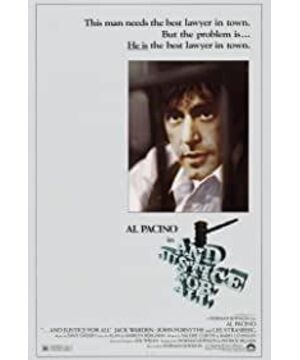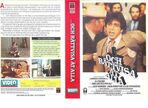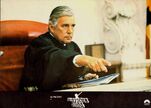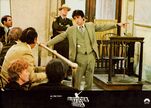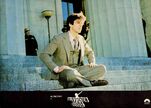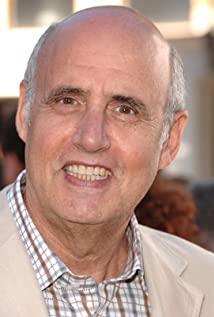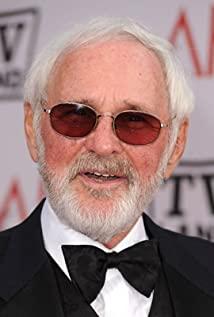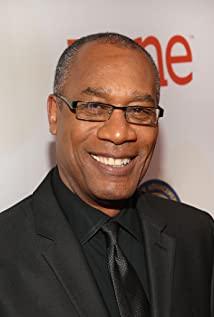1. At the beginning, the children slurred the "Justice for All" oath, and the whole film shows the chaos and utility of the legal system-judges and society full of prejudice, lawyers vying for fame, no The feeling committee... seems to tell the audience every moment: only innocent children will value "justice".
2. With the inexplicable and joyous music, what we see is the "warning" in front of various courts-"Everyone must search when entering the court", which represents the absolute authority of the court.
3. The rigid and superficial hearing system, the ubiquitous sentence transactions, the society full of prejudice, and the upper-class people who have fun at ease; Justice for ALL, but most of the "ALL" in the "ALL" have not been treated justice—— For example, the prison guard who helped Arthur get out of jail has lost his normal judgment. He looks like "evil is like hatred", but he is indifferent and numb. He has lost the most basic right and wrong of being a person. He has become the "screw" of this corrupt system. But I don't know that this judge just imposed his own desire for destruction on other people...
4. The film first shows the state of Arthur's grandfather in the nursing home-memory decline, repeating what has been said from time to time, and his behavior is also extremely mechanized; then it shows Arthur's hearing, and the committee members are constantly in the hearing segment Ask Arthur the same question, isn’t this just like Arthur’s grandfather-mental amnesia, rigid behavior-but grandfather is in the nursing home, which reflects the absence of the American legal system, just like Arthur said at the hearing YES: Your committee may be very useful in theory, but it has no practical significance (to the effect)-a microphone is used for unmanned hearings, which is more like a rigid rule, "walking through the scenes" for oneself. ".
5. The superficial judicial investigation system, and one of the investigators who appeared here, the heroine Ms Packer, regards her as a representative of this system for the time being. After hearing Carlo’s story and knowing why Arthur thought the committee was useless, she would sympathize with her, but she stopped sympathizing. She would still maintain her system, which is one-way, only for lawyers without considering the entire system. The system of other elements, even if you learn about Judge Fleming’s evil deeds later, it just persuades Arthur not to give up his future...
6. In this system, people are also very alienated-the upper-class people (including Arthur's first guest and Judge Fleming) who can do whatever they want because they have the money to find someone to help them get rid of crime are commonplace with conscientious work The various "screws" (prison guards, Ms Packer), profit-seeking colleagues, prosecutors who are passionate about official careers... everything is so normal to the general public that a judge with a clear tendency to self-destruct becomes what Ms Packer calls A "good judge" is just because he is still behaving normally in court, without considering whether his mental state is suitable for continuing to work; those lawyers who can not be influenced and only pursue "winning" and exonerate their clients "good lawyers" "And forget the purpose of the legal system: Justice for all.
Unlike them, Arthur cares about people, but in reality, his care seems so "unrealistic"-his partner Jay went crazy, Aiji hanged himself, and Carlo was shot in front of him... …It seems that he should actually be like Warren (his blond-haired colleague of lawyers), just to make money. After all, these are just "trivial things/small money", aren't they?
7. Arthur was deeply disappointed and confused, but at this time, his old client brought him Fleming's "third-level photos", and he went to confront Fleming, but it only made him more arrogant and arrogant. "Wolflessness"-after all, what is the truth and ugliness of things that can be solved with power? Evil is justified. This move only brought greater disappointment and despair-There is no justice for all.
8. Arthur finally obeyed his conscience and obeyed his grandpa's teachings-"If you are not upright, you are nothing." He roared, "Judge Fleming, he is a scumbag. He raped and assaulted this girl. !" He was pulled out and looked at it. Jay, who had been suffering from conscience before, stepped and put on a wig, and was striding towards the court (to defend the Jazz who killed two more children). Finally, a knowing blow.
After all, Grandpa now lives in a nursing home, which is not part of the wider society.
PS
1. All hearings and court sessions are like child's play-chaotic order, sophistry logic to help clients get rid of crime, imprisonment transactions in the interrogation field...It is exactly the contrast with the childish voices who read the oath at the beginning.
2. In the last scene of the court, no one cared about Arthur. The people in the newspaper were originally portraying the "respected" judge seriously, but when Arthur spoke, the sketcher turned his attention to Arthur. (After all, this is big news).
3. In fact, Arthur and Jay faced similar situations-both exonerated the upper class. The difference is: from the beginning, Jay is a lawyer who values the winning and losing of the case (from the moment he taught the first client to " Please "please" the judge, he himself can be seen according to the judge's liking in the court), he took the case of Jazz for his career, but when he knew that Jazz had committed a crime after he came out under his sophistry, he first struggled not to go to the court. The court, after successfully “adjusting” himself into a “defense machine”, appeared in the court; and Arthur, he actually knew that the court was not the place where the truth exists, but he would choose the more “harmless” cases ( (Like the drunk driving at the beginning), he will care about people, this is the teaching of his grandfather who read the law-integrity-this is also Arthur's own rules of conduct, but this time he has no choice, so he is confused with Arthur With eyes and cheerful music, the movie ends.
4. In the end, Ms Packer led people to cheer for Arthur. I hope this means that Arthur's utterance is not in vain, and that this rigid system will have a good change. (So put this one at the end)
View more about And Justice for All reviews


